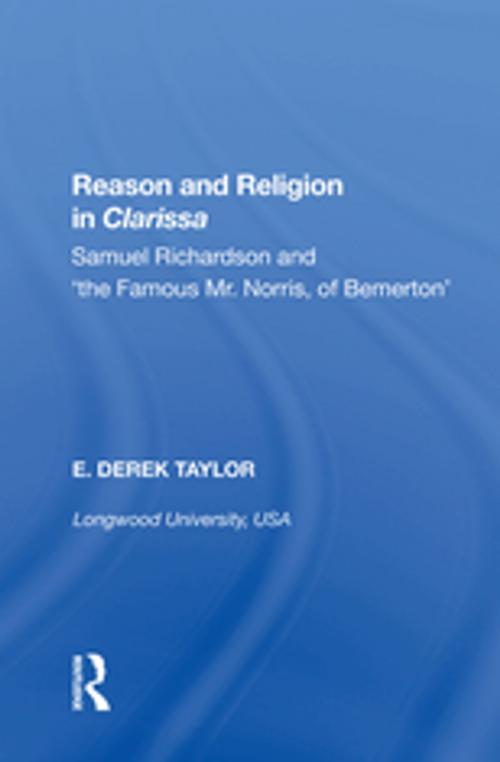Reason and Religion in Clarissa
Samuel Richardson and 'the Famous Mr. Norris, of Bemerton'
Fiction & Literature, Literary Theory & Criticism| Author: | E. Derek Taylor | ISBN: | 9781351150743 |
| Publisher: | Taylor and Francis | Publication: | November 30, 2017 |
| Imprint: | Routledge | Language: | English |
| Author: | E. Derek Taylor |
| ISBN: | 9781351150743 |
| Publisher: | Taylor and Francis |
| Publication: | November 30, 2017 |
| Imprint: | Routledge |
| Language: | English |
What distinguishes Clarissa from Samuel Richardson's other novels is Richardson's unique awareness of how his plot would end. In the inevitability of its conclusion, in its engagement with virtually every category of human experience, and in its author's desire to communicate religious truth, E. Derek Taylor suggests, Clarissa truly is the Paradise Lost of the eighteenth century. Arguing that Clarissa's cohesiveness and intellectual rigor have suffered from the limitations of the Lockean model frequently applied to the novel, Taylor turns to the writings of John Norris, a well-known disciple of the theosophy of Nicolas Malebranche. Allusions to this first of Locke's philosophical critics appear in each of the novel's installments, and Taylor persuasively documents how Norris's ideas provided Richardson with a usefully un-Lockean rhetorical grounding for Clarissa. Further, the writings of early feminists like Norris's intellectual ally Mary Astell, who viewed her arguments on behalf of women as compatible with her conservative and deeply held religious and political views, provide Richardson with the combination of progressive feminism and conservative theology that animate the novel. In a convincing twist, Taylor offers a closely argued analysis of Lovelace's oft-stated declaration that he will not be 'out-Norris'd' or 'out-plotted' by Clarissa, showing how the plot of the novel and the plot of all humans exist, in the context of Richardson's grand theological experiment, within, through, and by a concurrence of divine energy.
What distinguishes Clarissa from Samuel Richardson's other novels is Richardson's unique awareness of how his plot would end. In the inevitability of its conclusion, in its engagement with virtually every category of human experience, and in its author's desire to communicate religious truth, E. Derek Taylor suggests, Clarissa truly is the Paradise Lost of the eighteenth century. Arguing that Clarissa's cohesiveness and intellectual rigor have suffered from the limitations of the Lockean model frequently applied to the novel, Taylor turns to the writings of John Norris, a well-known disciple of the theosophy of Nicolas Malebranche. Allusions to this first of Locke's philosophical critics appear in each of the novel's installments, and Taylor persuasively documents how Norris's ideas provided Richardson with a usefully un-Lockean rhetorical grounding for Clarissa. Further, the writings of early feminists like Norris's intellectual ally Mary Astell, who viewed her arguments on behalf of women as compatible with her conservative and deeply held religious and political views, provide Richardson with the combination of progressive feminism and conservative theology that animate the novel. In a convincing twist, Taylor offers a closely argued analysis of Lovelace's oft-stated declaration that he will not be 'out-Norris'd' or 'out-plotted' by Clarissa, showing how the plot of the novel and the plot of all humans exist, in the context of Richardson's grand theological experiment, within, through, and by a concurrence of divine energy.















